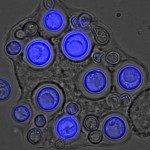Link to Pubmed [PMID] – 24970283
Lancet Infect Dis 2014 Oct;14(10):1011-21
Legionnaires’ disease is an important cause of community-acquired and hospital-acquired pneumonia. Although uncommon, Legionnaires’ disease continues to cause disease outbreaks of public health significance. The disease is caused by any species of the Gram-negative aerobic bacteria belonging to the genus Legionella; Legionella pneumophila serogroup 1 is the causative agent of most cases in Europe. In this Review we outline the global epidemiology of Legionnaires’ disease, summarise its diagnosis and management, and identify research gaps and priorities. Early clinical diagnosis and prompt initiation of appropriate antibiotics for Legionella spp in all patients with community-acquired or hospital-acquired pneumonias is a crucial measure for management of the disease. Progress in typing and sequencing technologies might additionally contribute to understanding the distribution and natural history of Legionnaires’ disease, and inform outbreak investigations. Control of Legionnaires’ disease outbreaks relies on rapid ascertainment of descriptive epidemiological data, combined with microbiological information to identify the source and implement control measures. Further research is required to define the actual burden of disease, factors that influence susceptibility, key sources of infection, and differences in virulence between strains of Legionella species. Other requirements are improved, specific, sensitive, and rapid diagnostic tests to accurately inform management of Legionnaires’ disease, and controlled clinical trials to ascertain the optimum antibiotics for treatment.

